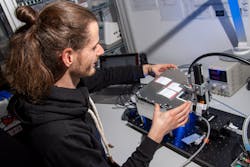Q.ANT (Stuttgart, Germany), which is a wholly owned subsidiary of TRUMPF (Ditzingen, Germany), and sensor specialist SICK (Waldkirch, Germany) will work together on the development of quantum optical sensors for industrial use. The collaboration began with a successful functional test of the quantum optical sensor for serial production.
Under the cooperation agreement, SICK will be responsible for application development and sales of the sensors, while Q.ANT will take on production of the measurement technology and, thus, the sensor’s core technology, explains Robert Bauer, Chairman of the Executive Board of SICK AG.
“Quantum technology is an enormous opportunity for German and European industry. This will be the first time that the partnership between our two high-tech companies will involve a product for serial production. The quantum sensor enables highly accurate measurements, and will provide insights that will lead to completely new industrial applications,” says Peter Leibinger, Chief Technology Officer at TRUMPF. The first use of the new quantum sensors is planned for 2021.
“Quantum technology enables, for example, ultrafast measurements of the movement and size distribution of particles. With industrialization of these sensors, not just us but Germany—as a high-tech location—takes a major step towards the commercialization of quantum technology,” says Michael Förtsch, CEO of Q.ANT. Using laser light, quantum sensors permit highly efficient measurements that would be impossible with conventional processes.
“Quantum technology is the next level for sensors because it shifts hitherto firmly established technical limits. Using quantum effects, additional details can be perceived from signal noise where, up to now, no specific signals would have been measureable. This enables the measurement of particles that are about two hundred times smaller than the width of a human hair,” says Niels Syassen, Senior Vice President R&D at SICK and responsible for the project there. The quantum sensors will initially be used for analyzing substances in air.
Quantum sensors could in future become everyday equipment in various industries. For example, they could be used in civil engineering to visualize underground structures before construction work begins; in the pharmaceutical industry, they could make it easier to determine the best composition of tablet powder; in the electronics sector, circuits could be inspected through surfaces; and highly accurate measurements could be made in industry in general. The market for quantum sensors could grow steadily with industrialization. Experts at Germany’s National Academy of Science and Engineering (Acatech) estimate the worldwide market volume of industrial quantum sensors at about €1.1 billion by 2023.
For more information, please visit sick.de and trumpf.com.
